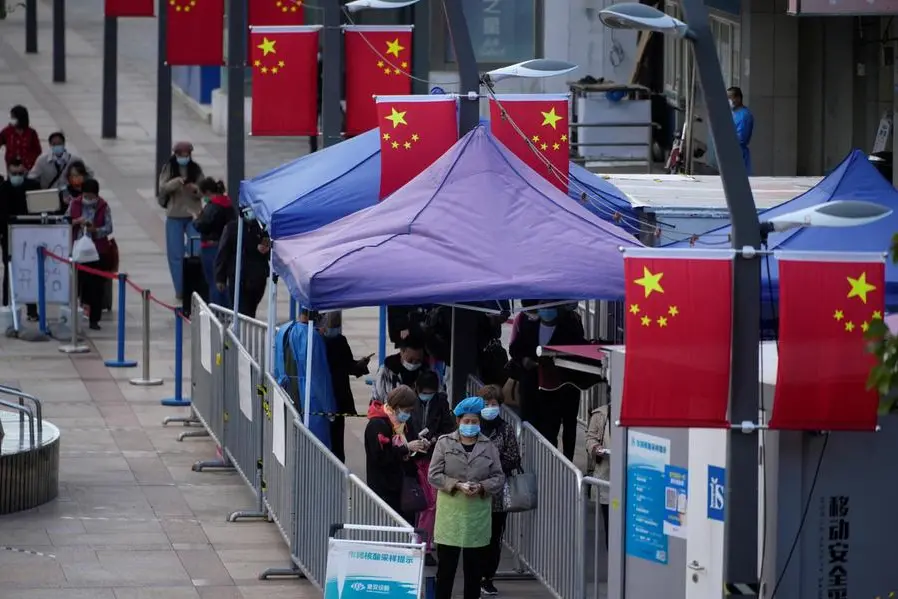PHOTO
BEIJING - China called for "patience" with its tough COVID policies and warned against any "war-weariness" as local cases soared to their highest since August, days ahead of a pivotal Communist Party congress.
Many countries are learning to co-exist with COVID-19, but China has repeatedly quashed any speculation of a let-up in its policies, which can range from locking down a local community to an entire city, even though fatalities remain low by global standards and symptoms, if any, are mostly mild.
Pressure on officials to stop outbreaks as soon as they spring up has risen in recent weeks as the highly transmissible Omicron sub-variants BF.7 and BA.5.1.7 appeared in mainland China for the first time, ensnaring travellers during a just-ended week-long national holiday.
Across China, 1,939 locally transmitted cases were reported on Oct. 9, the highest since Aug. 20, according to Reuters calculations based on official data published on Monday.
Thousands of cases caused by the BF.7 have been reported in Inner Mongolia since Oct. 1, turning the region into China's latest COVID epicentre and wrecking havoc on travel plans during the National Day "Golden Week" holiday.
A few days into the Golden Week, the western region of Xinjiang also barred people from leaving as cases ticked higher. Tourists stranded in Xinjiang could seek temporary work as electricians, cooks and wood craftsmen, advised authorities in its capital Urumqi.
Shanghai, which locked down its entire population of 25 million in April and May, reported 34 local cases on Oct. 9, the most in almost three months.
"The transmission and pathogenicity (of Omicron) have not weakened, and it still poses a relatively large threat to the elderly and people with underlying diseases," according to a commentary in the state-owned People's Daily on Monday.
"It is for this reason that we must remain vigilant against the spread of the epidemic, increase our confidence and patience in our country's epidemic prevention and control policies, and overcome any numbness of the mind, any war-weariness, any thought of leaving things to chance, and any complacency."
The COVID restrictions came days before a once-every-five-years Communist Party congress starting on Oct. 16, where Xi Jinping is widely expected to extend his decade-long leadership for another five years.
Xu, a native from Inner Mongolia who works in Beijing, had planned to take the train back to the Chinese capital on Oct. 7 after attending a friend's wedding in her hometown of Baotou, but has since been trapped there due to a local quarantine lockdown.
"What I worry most now is when I can get to return to Beijing," said Xu, who declined to identify herself further.
"All this waiting around is tough."
'NOT OVER'
While most of the new infections in Shanghai were detected in quarantine, the city's Putuo, Changning and Jiading districts weren't taking any chances, announcing on Monday the suspension of leisure and entertainment venues.
One recent Changning case was a man who arrived from Xinjiang on Oct. 2. He was declared a carrier five days later.
Guests at the hotel where he stayed have been locked down. Patrons to the bars and restaurants he visited have been treated as close contacts.
Sona and her husband were told to quarantine themselves at home after going to an underground bar strip the Changning case visited.
"It wasn't even the same day as the guy was there, and we weren't even at the same (restaurant)," said Sona, a foreigner who has lived in Shanghai for years, speaking on condition of anonymity.
They have not been able to leave their home, as a magnetic device on the door installed by the authorities would track its opening and closing.
"It's really, really hard to deal with - you think it's over, but it’s not over."
(Reporting by Ryan Woo; Additional reporting by Beijing Newsroom and Casey Hall in Shanghai; Editing by Raju Gopalakrishnan and Ana Nicolaci da Costa)





















